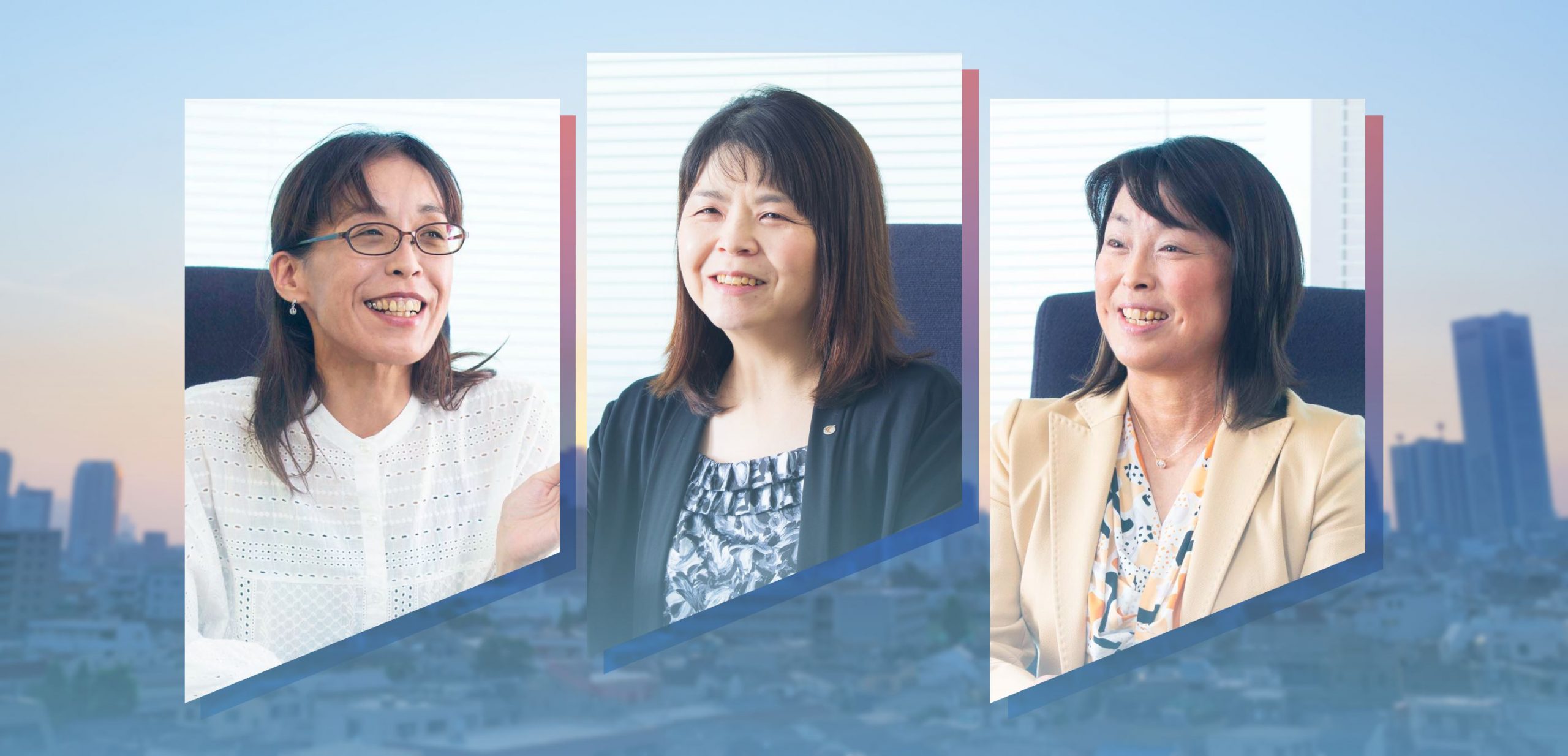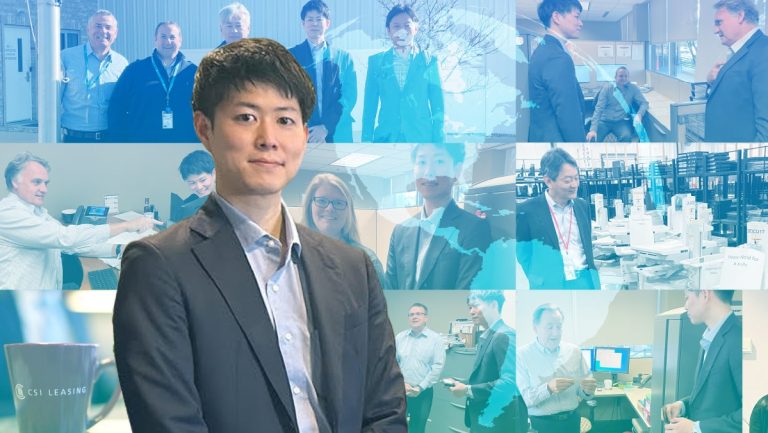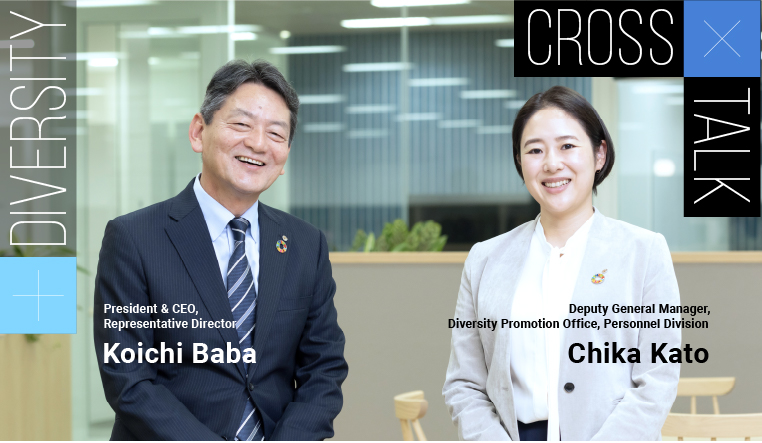
The Journey of Women’s Career Advancement at Tokyo Century from the 1990s to the Present—Three Managers Share Their Experiences
Nov 10, 2021
Tokyo Century has been striving to increase the ratio of female managers and promote diversity across its organization. For this article, we spoke with three managers who joined the Company in the 1990s, when very few female employees were in career-track positions. We asked them about their career paths, how things have changed at Tokyo Century since they were hired, and about the Company’s efforts to promote diversity and women’s career advancement.

Atsuko Kashiura
General Manager of Structured Finance Division
Joined the Company in 1996. She has worked in the now called Equipment Leasing Business and in the International Business. After working in the Structured Finance and Investor Relations Divisions, she has been in her current position since April 2021.

Yoshiko Onagi
Deputy General Manager, Head of Japanese Operating Lease Business Management, Financial Products Division
Joined the Company in 1996. She has worked in the now called Equipment Leasing Business and in the International and Specialty Financing Businesses. Including her maternity and childcare leave for her two children, she has been in her current position since 2019.

Miki Kimura
Deputy General Manager, Leased Asset Operations Division
In 1992, joined what is now the JFE Group’s leasing company, which merged with Tokyo Leasing in 2002. And she was assigned to an administrative position at the Leased Asset Operations Division. She has been in her current role since April 2021.
Looking Back on the 1990s, When Few Women Were in Career-Track Positions

――Women’s advancement has been attracting significant attention in Japan. What was the situation for women when you joined the company?

Onagi
There were very few women in so-called career-track positions, and these tended to be limited to specific regions, with no options for relocation or administrative postings, which was the situation for Ms. Kashiura and me.
Women tended to be treated like assistants back then, and I think that was the case in almost every company. Women wore uniforms and were expected to make photo copies, serve tea, and wipe down all the desks first thing in the morning.

Kimura

Kashiura
That came to be known as the “employment ice age” for new graduates, and I think everyone was having a hard time. Given the overall situation, women had no choice but to target a regionally limited career track position or administrative assistant. Although women’s career advancement in Japan was certainly lagging behind global standards, a lot has changed since then.
――Considering your share of hardships, what turning points have there been in your career?

Kashiura
I was transferred to the Structured Finance Division in 2003, and there I teamed up with a partner company to launch a new business. The experience built up my confidence, and I think my current work still benefits from that. I wanted to be able to negotiate with banks, securitization companies, and customers on an equal footing, so I devoted myself so completely that-as I look back-I now realize how very hard I was working. I was also proud of the fact that the work I was doing was becoming an established part of the operation.

Onagi
When I took the entrance exam, I applied for an administrative position. During the job interview, I was asked if I wanted to apply for a regional career-track position. I think that was the first turning point for me. And in my sixth year, I applied for what’s now referred to as the Career Challenge System and was able to move to the then International Business Division-the next big turning point for me. Women were rarely transferred those days, and there were several occasions when men hired after me were transferred before I was, so I wanted to take a step forward.
――Did many other women take advantage of the system?

Onagi
I think very few did. It has since become more common for female employees to work overseas or be relocated, but back then it was simply not the case.
――Ms. Kimura, you’ve been working in the Leased Asset Operations Division for quite a while, but your turning points came in the midst of mergers, didn’t they?
Yes, I went through two mergers. I joined a Leasing company of current JFE group before its merger. And when the company merged with Tokyo Leasing, I was on the side that was absorbed. But all the employees who wanted to stay in their jobs could do so at the new company, so I chose to stay on in the same division. A merger always involves system changes, and I remember the difficulties I faced at the time.

Kimura

――Remaining in one job to hone your expertise is a kind of career choice. What have been some of the most memorable moments in your work life, and what experiences do you still depend on?

Kashiura
When I was busy working on the launch of a new business with a partner company, we’d hold meetings every week and often go someplace afterward for dinner. Once my boss told me, “We’re building a team by sharing time together.” I thought this was wonderful-the idea of sharing time with team members, including customers, to create a new business, and I still embrace this on the job.

Onagi
During the entrance exam period, I interviewed with a senior female employee who was in a career-track position, and we had lunch together. There were still very few women in such a position. She was in her fourth year at the Company, very enthusiastic, and appeared quite confident.
At the time, female employees were expected to be feminine, as I mentioned earlier. So, admiring her attitude, I tried not to refer to being a woman as an excuse, no matter how hard some work was.
I’ve worked through two company mergers in which I was selected as a member of the team preparing for the events. These were great experience. I was selected to prepare for both mergers, so apparently my boss trusted me. I thought I’d work diligently on tasks as they came up. Mergers involve a wide variety of tasks, and we had to strictly observe the schedule. This was extraordinarily challenging, but I ultimately felt a great sense of accomplishment. I feel like putting my all into every assignment I was given has brought me to where I am now.

Kimura
Creating a System as Managers That Enables Diverse Members to Participate and Advance Their Careers

――The terms women’s career advancement, diversity, and inclusion are becoming more prevalent in Japan. How do you feel about this?

Kashiura
I feel that Japanese companies, including Tokyo Century, are gradually changing. Overseas companies, however, are moving even further ahead, so I think we need to step up a little faster. I can definitely feel, however, the growth of awareness within Tokyo Century.
Even though things are changing, I feel that Japanese society in general still harbors a stereotype of women as being good at certain things, while men are better at others. I also feel there’s still a strong tendency to link this stereotype to specific kinds of work and roles.

Kimura

Onagi
That’s true. Particularly in Europe and the U.S. there is a clear distinction between the tasks and roles required. This is the so-called “task-based system,” in which people apply for jobs and are hired based on their duties. Executing the responsibilities listed under your job description leads to promotion. So, I think that in this system, gender differences do not easily lead to career opportunities or positive appraisals.
I also sense that the gap between administrative and career-track positions at Tokyo Century is disappearing. Although this is good in general, at the same time I think that because we’re in the midst of change, the difference between the two is still unclear and somewhat confusing. That’s why it’s still important to understand the duties and expectations of each position as clearly as possible.

Kimura

Onagi
The labor shortage is expected to become more severe throughout Japan, and so it’s necessary to understand every employee’s strengths and weaknesses and take advantage of their skills for mutual benefit. How can we create fair opportunities for diverse employees to grow and guide them into situations in which they can perform well? And how can we assign tasks that make the most of their abilities and characteristics? These are also challenges we face as managers.

――As the number of people you supervise as a manager rises, how do you maintain open communication with them?

Kashiura
I’m trying to establish a horizontal organization so employees can freely express their opinions and consult with each other. I want to continue to be someone who’s easy to talk to, even after becoming a manager, so I try to have informal conversations with everyone. I also tell new staff to refer to me with “san” instead of my formal job title, like one of my former bosses who I deeply respected did.
We’re mainly working remotely these days due to the COVID-19 pandemic, so communication in general is still challenging. Though, I often come to the office for business reasons, the employees I supervise come just once a week or not at all. I keep track of their work schedules and try to speak with them as much as possible when they’re in the office.

Kimura

Onagi
I’ve realized the importance of verbal communication such as by phone, because sharing information through text only via chat and email often results in miscommunication. When I’m in the office, I can informally ask those around me for advice or let them listen to me complain about something. When I work from home, however, I tend to keep things to myself. With that in mind, I try to communicate by phone at least once a day or so. I say things like, “That seemed like a difficult situation. Are you okay?” And I value casual conversations as well. When talking to those who report to me, I’m often asked for advice, and I say something like, “Well, this is what actually happened...”
Enjoying Loneliness, Decision-Making, and Our Internal Dialogues as Managers

――Of course you face challenges as managers, but what motivates you and engages your interest?
It’s been just six months since I became deputy general manager in April 2021. I’m still trying things out, and I feel like I have my hands full with daily tasks. After hearing what Ms. Kashiura and Ms. Onagi have shared, I’d like to draw on the experiences of other managers.

Kimura:

Kashiura
Since becoming a general manager, I’ve had to make more decisions on my own. I sometimes feel lonely at such times, but not in a negative sense. My internal dialogue provides food for thought. Being able to receive a variety of information that wasn’t previously available to me has also made a difference. Managers enjoy the advantage of having access to a wealth of information, so I’d like to effectively apply that to my work.

Onagi
Managers bear the brunt of challenges on every front. I find that continually nerve-wracking. At the same time, I’ve discovered that overcoming problems helps me and those I supervise to grow. I’m also pleased when they share their real thoughts with me. And I think it’s important for managers to work things out with those they supervise rather than talk over them.

――What would you like to work on in the future?

Kashiura
I remember how hard it was for me when I launched a new operation from scratch in the Structured Finance Division, and when I worked on a business acquisition project. The difficulties, though, made the experiences much more rewarding. My goal is to develop new operations with my current employees in the Structured Finance Division while sharing a sense of satisfaction and enjoyment, as well as the occasional hardship.
I’m still experiencing many surprises in my new role as a manager, but I hope to learn every day and gain confidence so that I can earn more trust in my position.

Kimura

Onagi
Talking with both of you today has been encouraging and made me realize I’m not alone. There are still very few women in management positions in society, and I’m sure there are many others who feel the same way as we do. As a manager, I’d like to create more opportunities like this within the Company for other staff. Whenever one encounters an obstacle or has trouble making a decision, I believe that talking with someone else who’s faced similar problems will open up a new horizon.
*The contents of the article and the position titles are as of the date posted.
RECOMMEND ARTICLES

Dec 20, 2023
New risk factors hav…

—Employees Encouraged by Family Ties and Understanding of Their Work
Oct 19, 2023
Every August since 2…

Feb 22, 2023
With its founding bu…





